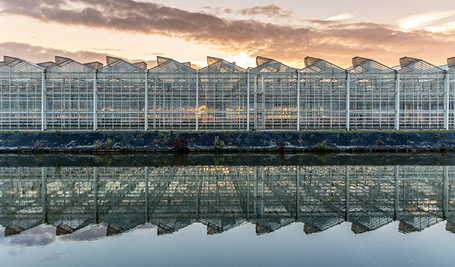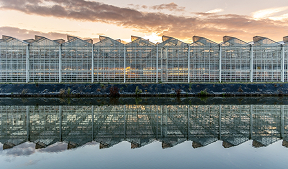a livable planet
ENVIRONMENT & SUSTAINABILITY
Energy
We have state-of-the-art greenhouses, where everything is designed to produce a beautiful, clean, and sustainable product.
To save and/or reuse as much energy as possible, we have implemented numerous provisions.
For example, our sorting halls are equipped with solar panels, which convert electricity into heat using e-boilers. In addition, we make use of energy surpluses from solar panels and wind turbines in the region. Finally, we take advantage of residual heat supplied by the ports and industries in the Rotterdam area.
State-of-the-art greenhouses
Designed to produce beautiful, clean, and sustainable products while saving and reusing as much energy as possible, and utilize residual heat from Rotterdam’s ports and industries.
The nice thing is that all this energy provided during the day can be stored. So, our greenhouses can also be heated at night with this energy. And the double screens in the greenhouses help retain the heat. This is done to use energy as efficiently as possible.
On less sunny days, we can switch to using combined heat and power units (CHPs). These are gas generators that convert gas into heat, CO2, and electricity. The heat and CO2 are used by the growers for the plants in the greenhouse, and the electricity is returned to the public power grid.
At present, we are conducting tests to extract CO2 from the air, with the goal of becoming climate-neutral in the next few years.
Water
We collect rainwater in enormous basins. The greenhouses are equipped with gutters that collect all the rainwater. This water is disinfected and filtered, then provided to the plants. Any excess water that the plants do not absorb is disinfected and filtered again through cultivation gutters and reused.

Water
We collect rainwater in enormous basins. The greenhouses are equipped with gutters that collect all the rainwater. This water is disinfected and filtered, then provided to the plants. Any excess water that the plants do not absorb is disinfected and filtered again through cultivation gutters and reused.

Biology
From the moment young plants enter our greenhouses, we use biological pest control methods. Many cameras are placed in the greenhouses to detect harmful insects, allowing us to immediately deploy biological predators such as predatory mites and parasitic wasps.
Periodically, we perform tests to check that the products are clean and free from pesticides. The results of these tests are shared with the customers.
To guarantee quality, sustainability, and a clean product, Dutch Salads has implemented several quality systems, such as GlobalGap, Grasp, IFS, PlanetProof, and Sedex. These systems document our working methods and archiving. They are set up in collaboration with the industry and retailers and are audited annually.
We share all certificates, relevant documents, and MRL analysis results with our customers via Agriplace.